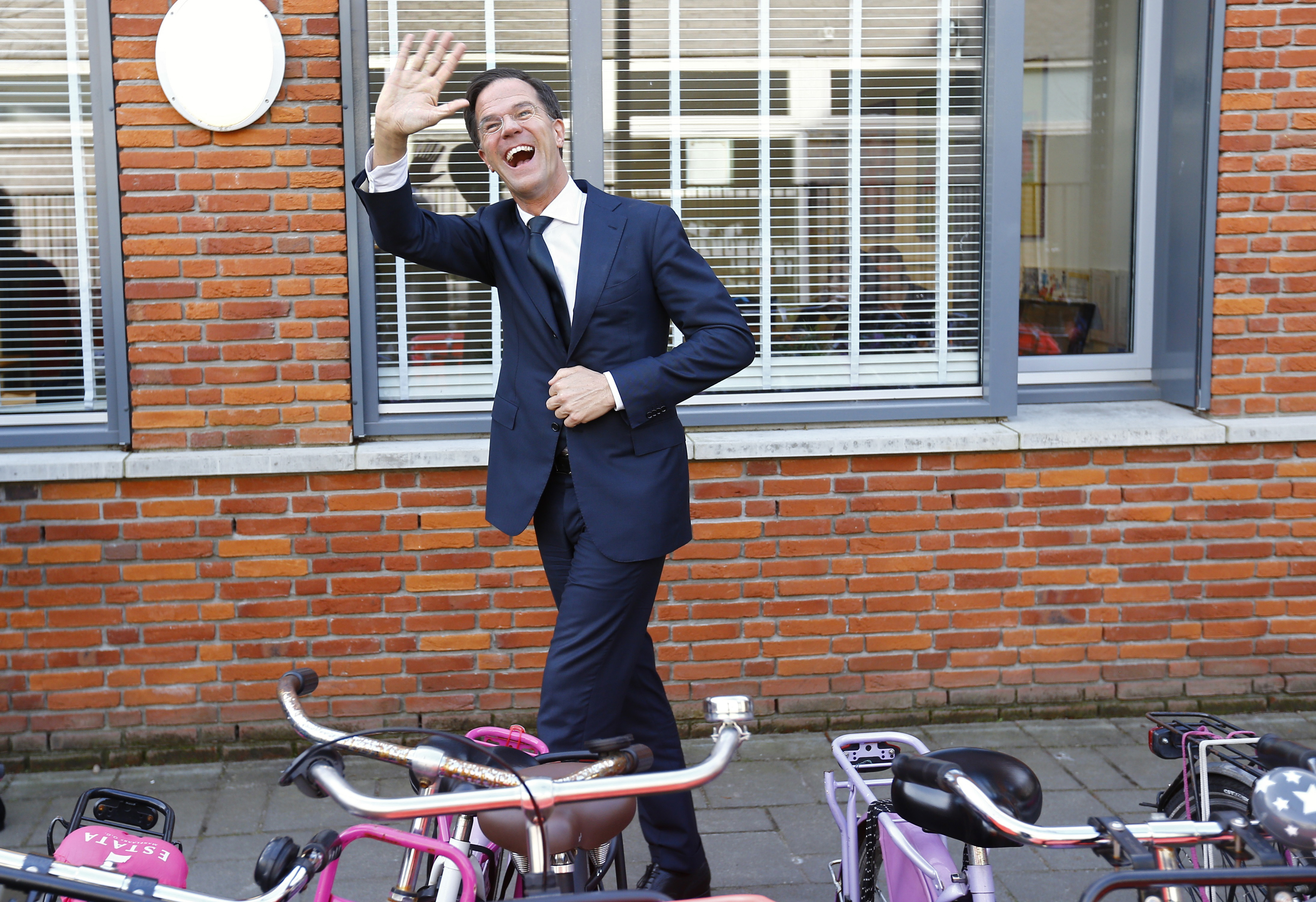Updated 3/16/2017 to reflect the latest election results.Populist firebrand Geert Wilders and his PVV party failed to live up to the hype following them into the Netherlands elections Wednesday, winning only 20 seats in the country’s parliament — far short of the 30 they were predicted to win at the start of the year.The results will keep the anti-Muslim, anti-immigrant Wilders firmly outside of any ruling coalition government. Instead, by sheer virtue of a highly splintered Dutch electorate, and despite losing 8 seats, incumbent Prime Minister Mark Rutte and his center-right VVD party remain the largest party in government, and best positioned to head up the country’s next coalition government.In a highly fractured and divisive race dominated by the issues of immigration and integration, voter turnout was much more robust than previous elections, with exit polling showing turnout sky-rocket to a 31-year high of 82 percent, up 17 percentage points from 2012. The results no doubt will be seen not only as a personal blow for Wilders, but a sharp rebuke of the surging populism growing across Europe in recent years.The far-right Wilders always faced an uphill battle to being a serious contender in Dutch politics — the Netherlands has a complicated proportional representation system that all but guaranteed he would be on the outside of any coalition government, and almost every political party in the country pledged not to work with him, citing his dangerous and divisive anti-muslim rhetoric.Wilders did, however, have a notable effect on mainstream Dutch politics. Rutte tacked further to the right in this election, attempting to hold on to voters Wilders was siphoning off. Rutte employed a decidedly harsher rhetoric on both immigration and Islam, telling those who do not wish to assimilate to “fuck off.”Rutte also took a strong stance in a recent diplomatic dispute with Turkey when Dutch authorities refused to allow Turkey’s foreign minister to campaign in Rotterdam over the weekend, a decision that prompted a series of verbal attacks from Turkish President Recep Tayyip Erdogan. Yet he refused to back down, and Dutch voters may have rewarded him for it; one survey showed that 86 percent of voters approved of how the prime minister handled the situation in the run-up to Wednesday’s elections.Overall, this election cycle saw a decline in support for all the mainstream Dutch political parties. The center-left Labour party experienced historic losses in the polls, shedding 29 seats. The desertion of traditional center-left parties was a boon for the so called “Dutch Trudeau” Jesse Klaver, whose Groenlinks party picked up 12 seats. Many voters on the left were uneasy about the willingness of traditional parties to adopt parts of Wilders’ extreme anti-muslim rhetoric.The Greens appeared ecstatic with Wednesday’s results.
The results no doubt will be seen not only as a personal blow for Wilders, but a sharp rebuke of the surging populism growing across Europe in recent years.The far-right Wilders always faced an uphill battle to being a serious contender in Dutch politics — the Netherlands has a complicated proportional representation system that all but guaranteed he would be on the outside of any coalition government, and almost every political party in the country pledged not to work with him, citing his dangerous and divisive anti-muslim rhetoric.Wilders did, however, have a notable effect on mainstream Dutch politics. Rutte tacked further to the right in this election, attempting to hold on to voters Wilders was siphoning off. Rutte employed a decidedly harsher rhetoric on both immigration and Islam, telling those who do not wish to assimilate to “fuck off.”Rutte also took a strong stance in a recent diplomatic dispute with Turkey when Dutch authorities refused to allow Turkey’s foreign minister to campaign in Rotterdam over the weekend, a decision that prompted a series of verbal attacks from Turkish President Recep Tayyip Erdogan. Yet he refused to back down, and Dutch voters may have rewarded him for it; one survey showed that 86 percent of voters approved of how the prime minister handled the situation in the run-up to Wednesday’s elections.Overall, this election cycle saw a decline in support for all the mainstream Dutch political parties. The center-left Labour party experienced historic losses in the polls, shedding 29 seats. The desertion of traditional center-left parties was a boon for the so called “Dutch Trudeau” Jesse Klaver, whose Groenlinks party picked up 12 seats. Many voters on the left were uneasy about the willingness of traditional parties to adopt parts of Wilders’ extreme anti-muslim rhetoric.The Greens appeared ecstatic with Wednesday’s results.
Advertisement
In fact, the looming figure cut by Wilders transformed the country’s typically low-profile election into an international spectacle. Thanks to Brexit and President Donald Trump’s surprise November win, the crowded Dutch election (a record 28 parties) was billed by international media as a “bellwether vote” for populism and the future of Europe.

Advertisement
A coalition government involving four parties will now begin to take shape. But despite the underwhelming result, Wilders has established himself as a strong political fixture in the Netherlands. As he cast his vote Wednesday morning, he told reporters: “Whatever the outcome of the election today, the genie will not go back into the bottle. People feel misrepresented.”Read more:Part Trump, part Marine Le Pen: Geert Wilders could disrupt the Dutch electionThe progressive left’s big hope in the Netherlands looks like Trudeau but says he’s more like Bernie